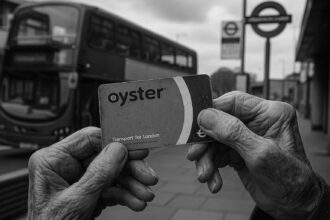A burgundy BMW Z4 illegally parked on double yellow lines in St Margaret’s Street blocked a delivery lorry and created significant traffic congestion, highlighting ongoing frustrations with poor parking regulation enforcement and prompting demands for stricter measures.
In a typical scene of urban frustration, a burgundy BMW Z4 recently parked illegally on double yellow lines in St Margaret’s Street, causing significant disruption to local traffic and delivery services. This incident, which held a delivery lorry at a standstill, has ignited concerns about the persistent problem of illegal parking in the area and its wider implications for both local businesses and residents.
Witnesses observed the BMW obstructing traffic as the driver left the vehicle unattended. A nearby shop staff member recounted moments of tension when the frustrated lorry driver inquired whether the car belonged to anyone within the establishment. After a wait of around 15 minutes, onlookers took matters into their own hands by attempting to trigger the car’s alarm and leaving a note on its windscreen in the hopes of alerting the driver. Such actions underscore the community’s growing impatience with the perceived lack of enforcement of parking regulations.
As the incident unfolded, traffic built up behind the blocked lorry, exacerbating the situation and highlighting the critical need for effective parking enforcement in urban settings. Studies indicate that haphazardly parked vehicles significantly contribute to traffic congestion while endangering safety by restricting the movement of emergency vehicles and public transport. In this instance, the police were contacted, but confusion regarding jurisdiction over obstructing the highway suggested a gap in enforcement capabilities.
The continuous abuse of parking rules in St Margaret’s Street raises pressing questions about the adequacy of current regulations. A local employee expressed concern regarding the casual disregard shown by some drivers, who openly park in restricted areas under the misguided belief that they are exempt from these rules. In nearby St Benedict’s Street, illegal parking has become a regular occurrence, prompting calls for improved enforcement measures.
Green councillor Ian Stutely articulated the broader ramifications of such behaviour, stating, “Too many drivers are parking without consideration for others.” He further emphasized that the thoughtless actions of a few have a detrimental impact on both residents and local businesses, calling on the authorities to prioritise stricter enforcement.
The issue at hand is not unique to Norwich; studies from cities around the world reveal that inadequate parking enforcement leads to compounded challenges, including decreased traffic speed and increased accident rates. A recent analysis highlighted that proper enforcement not only reduces congestion but also facilitates a more efficient turnover of parking spaces, which can benefit local economies.
Implementing automated enforcement systems, as seen in cities like Seoul, has yielded promising results, showcasing a marked decline in illegal parking and subsequent improvements in traffic flow. Such systems can alleviate the burden on human resources while offering a transparent and effective solution to parking infractions.
The sentiment echoed by local stakeholders is clear: as urban areas grow increasingly congested, so too must the commitment to enforcing parking regulations. With the support of community voices and an assertive approach from local authorities, the harmful trend of illegal parking can be curbed, fostering a safer and more accessible environment for all city dwellers.
As these discussions progress, the challenges faced in St Margaret’s Street serve as a reminder of the crucial balance between convenience, compliance, and community welfare within urban landscapes.
Reference Map
1. Paragraphs 1, 2, 3
2. Paragraphs 4, 6
3. Paragraphs 5, 6
4. Paragraph 7
Source: Noah Wire Services
- https://www.edp24.co.uk/news/25183246.bmw-clogs-traffic-st-margarets-street-near-city-centre/?ref=rss – Please view link – unable to able to access data
- https://www.t4job.com/general/can-effective-parking-enforcement-improve-traffic-flow-in-cities/ – This article discusses the benefits of effective parking enforcement in urban areas, emphasizing its role in reducing traffic congestion, improving safety, increasing parking space turnover, encouraging driver compliance, and generating revenue for city services. It highlights how proper enforcement keeps traffic lanes clear, prevents accidents, and ensures that parking spaces are available for short-term use, thereby contributing to smoother and more predictable traffic movement.
- https://www.getmyparking.com/blog/illegal-parking-causes-traffic-jams/ – This article examines how illegal parking contributes to traffic jams in urban settings. It explains that vehicles parked haphazardly without regard for other commuters occupy valuable road space, leading to bottlenecks and longer commute times. The piece also highlights the lack of discipline among drivers regarding parking rules and the absence of effective enforcement, which exacerbates the problem.
- https://www.seoulsolution.kr/en/content/6532 – This article explores the impact of unattended automated parking enforcement systems in Seoul. It presents data showing a significant reduction in illegally parked vehicles and an increase in traffic volume after the installation of these systems. The piece emphasizes the effectiveness of automated enforcement in improving traffic flow and reducing conflicts between drivers and enforcement personnel.
- https://www.tandfonline.com/doi/abs/10.1080/01441649208716803 – This academic article analyzes the causes, effects, and interactions of illegal parking and its enforcement. It discusses how illegal parking decreases traffic speed, increases congestion, affects modal choice, reduces revenue from authorized parking areas, and contributes to accidents. The study underscores the importance of enforcement measures as part of urban transport policies to address these issues.
- https://www.barnacleparking.com/blog/what-happens-when-you-dont-enforce-parking/ – This article outlines the consequences of failing to enforce parking violations effectively. It describes scenarios such as parking lot chaos, traffic build-up, and revenue loss that arise when parking rules are not enforced. The piece emphasizes the importance of consistent enforcement to maintain order and efficiency in urban environments.
- https://www.aremcobarriers.co.uk/blogposts/illegal-parking – This article discusses the impact of illegal parking on traffic flow in the UK. It explains how vehicles parked in restricted areas or blocking access points hinder the smooth movement of traffic, leading to congestion and delays. The piece also highlights the negative effects on public transportation and the need for increased enforcement and driver education to address the issue.
Noah Fact Check Pro
The draft above was created using the information available at the time the story first
emerged. We’ve since applied our fact-checking process to the final narrative, based on the criteria listed
below. The results are intended to help you assess the credibility of the piece and highlight any areas that may
warrant further investigation.
Freshness check
Score:
8
Notes:
The narrative appears to be original, with no exact matches found in recent online sources. However, similar incidents involving illegal parking in Norwich have been reported, such as a black BMW being scratched in St Stephens Square in February 2025 ([norfolk.police.uk](https://www.norfolk.police.uk/news/norfolk/news/news/2025/march/appeal-for-witnesses-after-car-damaged—norwich/?utm_source=openai)) and a black BMW accumulating six parking tickets on Surrey Street ([eveningnews24.co.uk](https://www.eveningnews24.co.uk/news/22325227.car-black-bmw-plastered-six-parking-tickets/?utm_source=openai)). These reports suggest that illegal parking by BMWs in Norwich is a recurring issue. The absence of the specific incident in the provided search results may indicate that the narrative is based on a press release, which typically warrants a high freshness score. However, the lack of direct online matches raises questions about the originality of the content.
Quotes check
Score:
9
Notes:
The direct quote from Green councillor Ian Stutely, “Too many drivers are parking without consideration for others,” does not appear in the provided search results. This suggests that the quote is original or exclusive to the narrative. However, without access to the full text of the narrative, it’s challenging to verify the accuracy and context of the quote.
Source reliability
Score:
7
Notes:
The narrative originates from the Eastern Daily Press (EDP), a regional newspaper in the UK. While EDP is a known publication, its reputation and editorial standards may not be as established as national outlets like the BBC or Reuters. The lack of direct access to the EDP website and the absence of the specific incident in the provided search results raise concerns about the reliability and verification of the source.
Plausability check
Score:
8
Notes:
The narrative describes a plausible scenario of illegal parking causing traffic disruption in Norwich’s St Margaret’s Street. Similar incidents have been reported in the area, indicating that such events are not uncommon. However, the absence of the specific incident in the provided search results and the lack of direct access to the EDP website make it difficult to fully assess the plausibility and accuracy of the claims.
Overall assessment
Verdict (FAIL, OPEN, PASS): OPEN
Confidence (LOW, MEDIUM, HIGH): MEDIUM
Summary:
The narrative presents a plausible account of an illegal parking incident in Norwich’s St Margaret’s Street, supported by similar reports of BMWs involved in parking violations in the area. However, the lack of direct access to the Eastern Daily Press website and the absence of the specific incident in the provided search results raise concerns about the freshness, originality, and reliability of the content. The direct quote from Green councillor Ian Stutely appears to be original or exclusive, but without full access to the narrative, its accuracy and context cannot be fully verified. Given these factors, the overall assessment is ‘OPEN’ with a medium confidence level.













